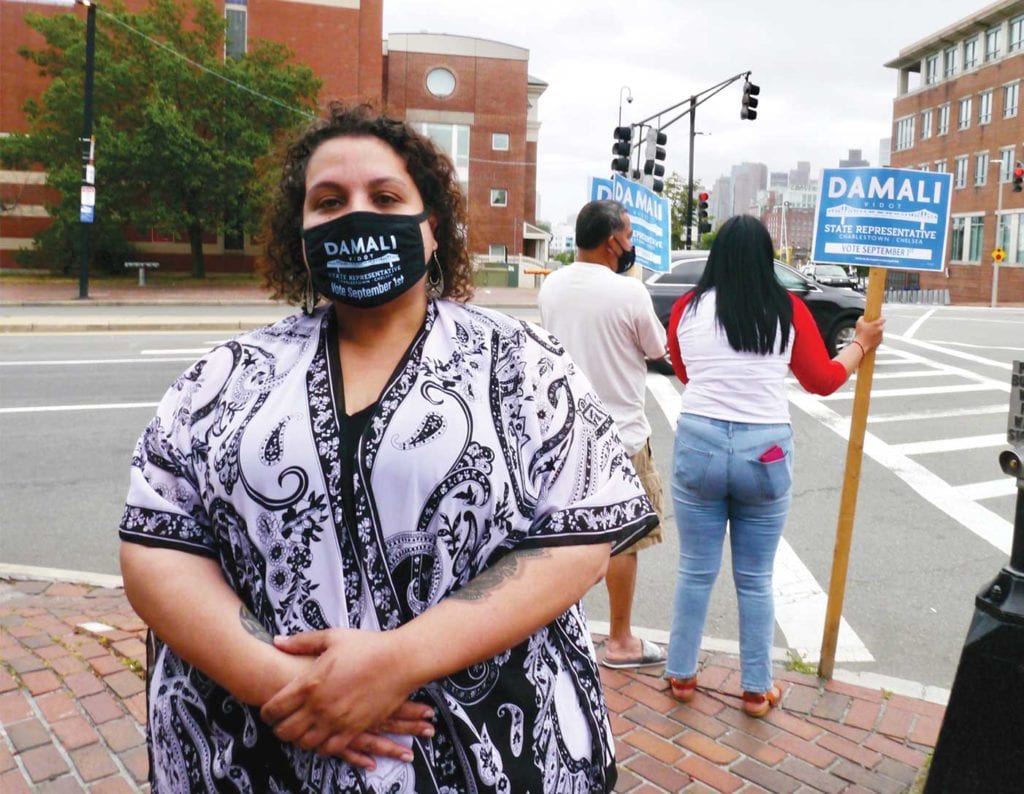
Last year, Damali Vidot was the top vote-getter in the Chelsea at-large City Council race. This year, she’s set her sights on the State House, taking on three-term incumbent Dan Ryan in the race for the 2nd Suffolk District.
If successful, Vidot would be the first woman, the first Latina and the first Chelsea resident to represent that district, which includes the majority-white, higher-income Boston neighborhood of Charlestown along with its majority-Latino neighbor across the Mystic River.
Vidot said she was spurred to run in April when she witnessed first-hand the devastation wrought on her neighborhood by the economic fallout from the COVID-19 pandemic.
“I looked out my window at a pop-up food shelter,” she said. “I saw mothers waiting hours for food. It got me going.”
Ryan, who came to office via a special election called after former Rep. Eugene O’Flaherty was appointed chief legal counsel for Mayor Martin Walsh in 2014, argues there’s little difference between him and Vidot.
“Damali and I have been in office almost the same amount of time,” he said.
Ryan’s entrance into public service began in 1991 when he worked as a teen center director for the Boys & Girls Club in Charlestown. Through his work, he got involved in public health projects, collecting information about the health needs of people in Charlestown, at that time a largely working-class community, and Chelsea.
“We were heading into the opium epidemic,” he said. “You’d hear people talking about how we needed more services. We used public health data to back up what we were seeing and hearing in the streets.”
Ryan says he’s carried to the State House the method he applied to public health issues in Charlestown and Chelsea.
“You listen to what people are saying on the streets, then you use their stories and data to influence decisions,” he said.
A spate of challenges
In taking on Ryan, Vidot is seeking to tap into the same wave of change that in 2018 swept into office U.S. Rep. Ayanna Pressley, Suffolk County District Attorney Rachael Rollins and state Reps. Nika Elugardo, Maria Robinson and Trinh Nguyen.
The COVID pandemic puts an exclamation mark on the urgent need for change, Vidot said.
“How can we expect leaders from the past to guide us out of this situation when they’ve turned a blind eye to housing insecurity and food insecurity?” she said. “COVID has given us permission to reimagine and challenge the systems that have left us behind.”
Vidot is one of several progressive candidates of color vying for the legislature this year. Springfield City Councilor Adam Gomez is taking on incumbent James Welch in the Hampden Senate District. In Brockton, City Councilor Moises Rodrigues is challenging Michael Brady for the 2nd Plymouth and Bristol Senate district.
In Boston, three Black attorneys are running for the 12th Suffolk District seat held by outgoing Rep. Dan Cullinane.
“I think voters are really ready for big ideas to address issues that have been festering for decades,” said Jordan Berg Powers, executive director of Mass Alliance, a coalition that helps elect progressives.
During the 2018 election cycle, legislators who counted themselves among the progressive ranks found themselves bumping up against political activists’ fierce opposition to House leadership, which has long been seen as blocking progressive change in the state on issues ranging from criminal justice reform to environmental justice.
“They’re not taking on big issues,” Powers said of legislative leadership. “Other states — even Republican-led states — have passed legislation to make it easier for immigrants to obtain driver’s licenses. In blue Massachusetts, we can’t even pass one piece of legislation to challenge Trump on immigration.”
Ryan, who is vice chair of House Committee on Post Audit and Oversight, is part of the leadership that Powers says is under fire. But Ryan said the Legislature has made progress on issues such as the criminal justice reform bill that lawmakers have been working on this year.
“We’ve had a progressive six years of moving on progressive issues,” he said. “But as the pandemic has shown us, we have a lot more to do.”
On that point, Vidot agrees.
“People are losing their jobs,” she said. “People are losing housing. People don’t know where their next meal will come from.”
Ryan beat out at-large Chelsea City Councilor Roy Avellaneda for the 2nd Suffolk seat in 2014 with 66 percent of the vote. This year, he has secured the endorsement of Boston City Councilor Lydia Edwards. He says he can make inroads into Vidot’s city, citing endorsements from Chelsea city councilors Leo Robinson and Calvin Brown.
“I have good relationships with pretty much the entire City Council,” he said. “I’ve had a good relationship with Damali. We respect each other’s work.”
Vidot has secured the support of fellow Chelsea city councilors Enio Lopez and Yamir Rodriguez. She has raised more than $58,000 since April — a significant haul for a candidate making her first run for state office.
“This is three times the amount I’ve raised in all my city council races in half the time I’ve had in any of them,” she said. “People want change.”
A new Charlestown?
To win the seat, Vidot will have to hold down her electoral base in Chelsea and make inroads in Charlestown. While in the past, Charlestown’s identity as an Irish-American enclave often meant limited success for candidates of color, gentrification has changed the equation there, bringing in young professionals who are at times more willing to vote across racial lines. Lydia Edwards won the vote there in 2017, becoming the first African American to represent the neighborhood on the City Council.
Vidot says she’s targeting both long-term Charlestown residents and those who have arrived in recent decades.
“A lot of the people who have moved into the neighborhood don’t know who their state rep is,” she said. “People want change.”






